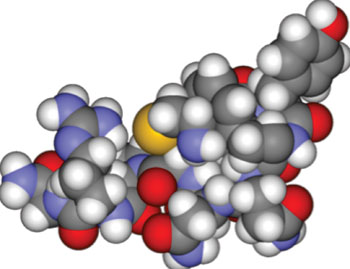Antibody Treatment Slows Lung Cancer Growth in Mouse Model
By LabMedica International staff writers
Posted on 17 Mar 2014
A monoclonal antibody that specifically binds to the surface marker ProAVP (pro-vasopressin) impaired the growth of small-cell lung cancer tumors in a mouse model.Posted on 17 Mar 2014
Investigators at Dartmouth College (Hanover, NH, USA) previously had demonstrated that human small-cell lung cancer (SCLC) seemed to universally express the vasopressin gene, and this led to the presence of a cell surface marker representing the entire pro-hormone precursor.

Image: Space-filling model of the peptide hormone vasopressin (Photo courtesy of Wikimedia Commons).
Vasopressin, which is derived from a pro-hormone precursor that is synthesized in the hypothalamus and stored in vesicles at the posterior pituitary, is a peptide hormone that controls the reabsorption of molecules in the tubules of the kidneys by affecting the tissue's permeability. It also increases peripheral vascular resistance, which in turn increases arterial blood pressure. It plays a key role in homeostasis, by the regulation of water, glucose, and salts in the blood.
The investigators treated a group of SCLC mice with MAG-1, a mouse monoclonal antibody specific for the pro-vasopressin C-terminal moiety. They reported in the February 14, 2014, online edition of the journal Frontiers in Oncology that the antibody attached to SCLC cells and it was internalized. Antibody treatment decreased the rate of increase in tumor size by half, and doubling time by about three-fold. Normal tissues seemed not to be affected.
"We are developing methods of antibody-targeted treatment for recurrent small-cell lung cancer," said senior author Dr. William G. North, professor of physiology at Dartmouth College. "Targeting with a humanized MAG-1 can likely be effective, especially when given in combination with chemotherapy, for treating a deadly disease for which there is no effective therapy."
Related Links:
Dartmouth College













